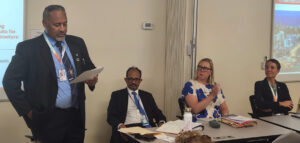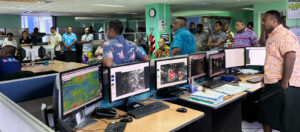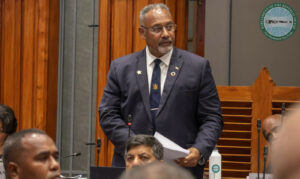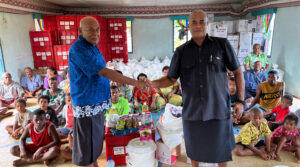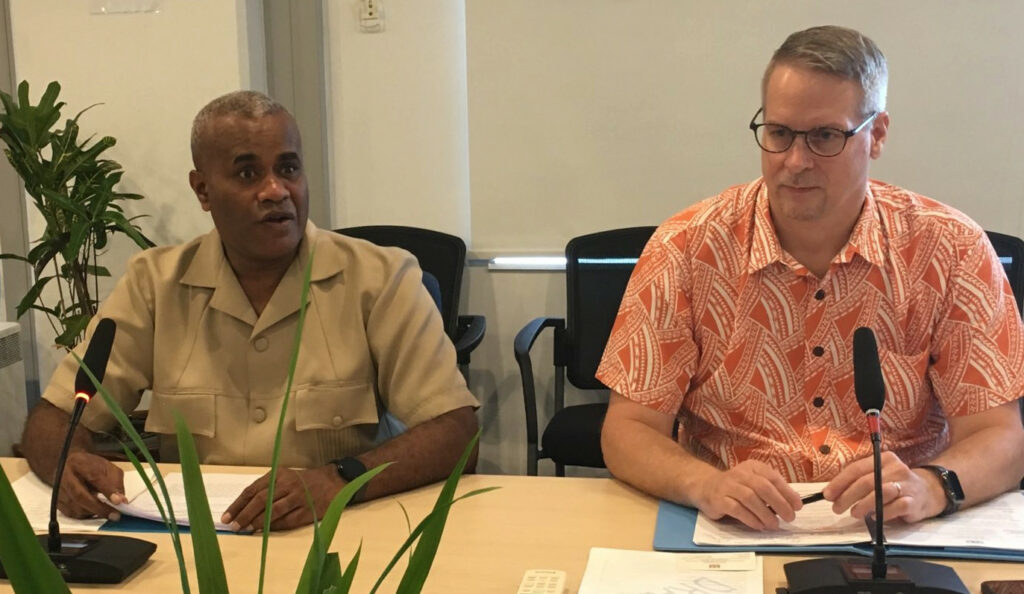
Talemaibua addresses the Anticipatory Action Final Meeting in Suva on October 31 as the United Nations Resident Coordinator (UNRC) Mr. Dirk Wagener looks on.
SUVA – Fiji continues to develop strong national meteorological and geo-hazard services that have substantially contributed to reducing disaster mortality and losses from cyclones, floods, and tsunamis, says Permanent Secretary for Rural and Maritime Development and Disaster Management Mr. Isoa Talemaibua.
While addressing a forum on the Anticipatory Action (AA) Final Meeting in Suva last month, Mr. Talemaibua highlighted that Fiji was increasingly investing in developing impact-based weather forecasting and ensuring effective public communication of weather warnings with a focus on the most vulnerable members of communities.
He said Fiji was now also undertaking the development of a people-centered Multi-Hazard Early Warning System.
Fiji will pilot the Anticipatory Humanitarian Action Central Emergency Response Fund (CERF) with an approved funding of FJD$2 million.
Anticipatory Action involves taking proactive measures before predicted hazards fully unfold to prevent or reduce humanitarian impacts. It is based on pre-agreed activities, triggers, and decision-making rules to ensure the swift release of pre-arranged financing. By utilising early warning systems and scientific advancements in disaster prediction, anticipatory action maximises the opportunity to intervene and prevent or mitigate imminent humanitarian impacts. This approach emphasises linking humanitarian action to risk and vulnerability, rather than solely focusing on needs and suffering.
At today’s meeting of UN Partners and the National Cluster leads, PS Talemaibua reiterated the purpose of this pilot project in that to test anticipatory action viability in the Pacific region with the aim of establishing it as a regular operational approach for disaster-prone countries in the region.
“This anticipatory approach preserves people’s dignity and allows for a faster recovery, protecting hard-won development gains. Let me reiterate what I had shared with you in our last convening; the humanitarian system must be as anticipatory as possible, and only as reactive as necessary. We will definitely have a lot of learnings from this pilot project and we all should work together to ensure these learnings are well documented so that necessary actions can be undertaken to improve and further strengthen our systems and processes. I would also like to stress the importance of community sensitisation on all AA activities and the project as a whole. The National Cluster leads shall work closely with the National Disaster Management Office (NDMO) to ensure our communities are well aware of the anticipatory action activities,” said Mr Talemaibua.
“The AA project also aims to complement existing mechanisms rather than undermining community resilience and this should really form the basis of our deliverables.”
Under the leadership of the United Nations Resident Coordinator (UNRC) Mr. Dirk Wagener, the United Nations Office for Coordination of Humanitarian Affairs (UNOCHA) and the United Nations Office for Disaster Risk Reduction (UNDRR), have been working in close collaboration with the NDMO, Fiji Meteorological Services, other Government and UN partners to finalise the framework that will guide the implementation process of this pilot project in Fiji.

Caption: Permanent Secretary for Rural and Maritime Development and Disaster Management Mr. Isoa Talemaibua and the United Nations Resident Coordinator (UNRC) Mr. Dirk Wagener with representatives of UN Partners, the Fiji NDMO, other key agencies of Government and Cluster Leads after the Anticipatory Action Final Meeting in Suva last month.
-ENDS-
The Ministry of Rural and Maritime Development and Disaster Management is responsible for implementing development strategies that bring Fijians living in rural and maritime regions the same level of access to essential services and economic opportunities as anywhere else in the country. We coordinate and implement the Fiji Government’s rural and maritime development initiatives with a mission to empower Fiji’s rural sector. We also spearhead disaster risk reduction initiatives at national and sub-national level including disaster preparedness, response, and recovery. We have offices for each of Fiji’s 14 provinces including Rotuma, leading the Fijian Government’s rural development and disaster risk management operations.
Follow us on Twitter @MRMDFiji @FijiNDMO| Facebook: @developmentfiji
For press enquiries:
Aqela Susu, MRMDDM, Tel. +679 3216456/+679 9985670,
Email: aqela.susu@govnet.gov.fj/susuaqela@gmail.com


